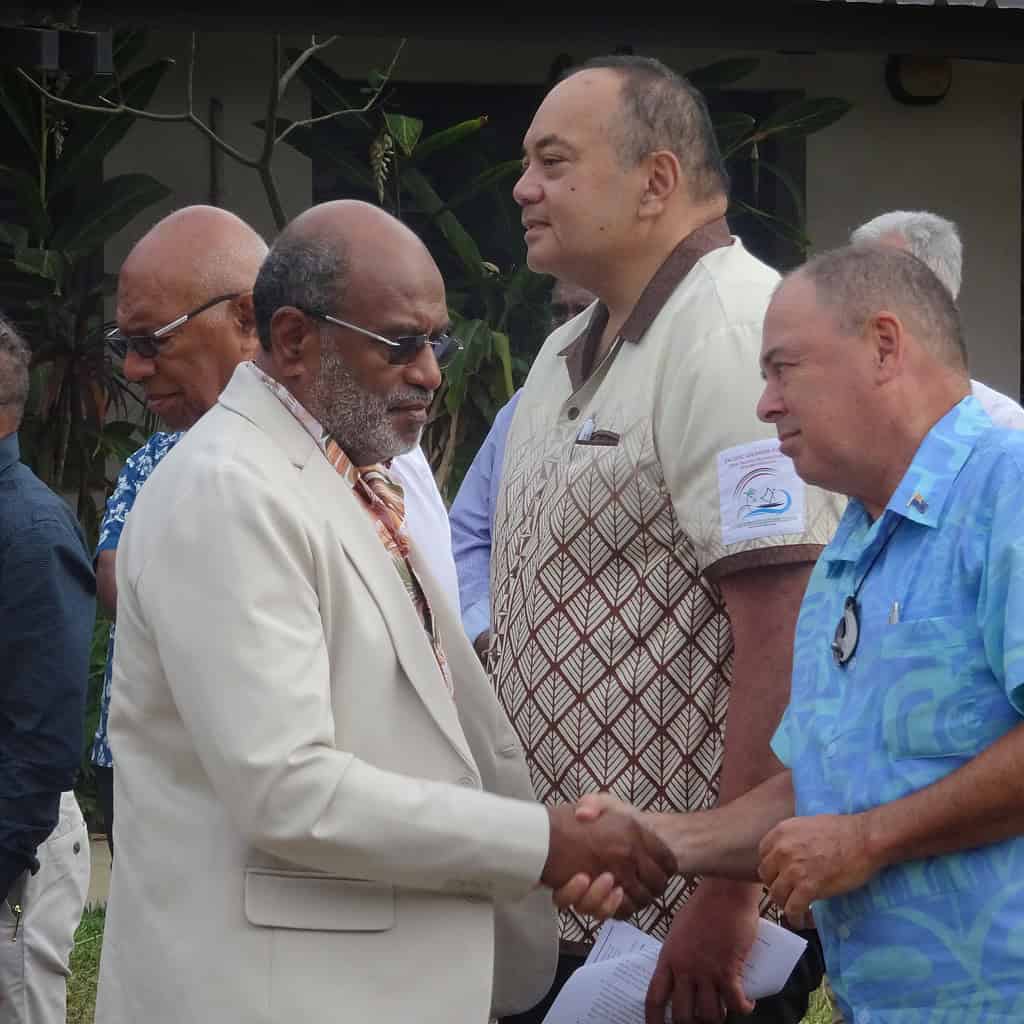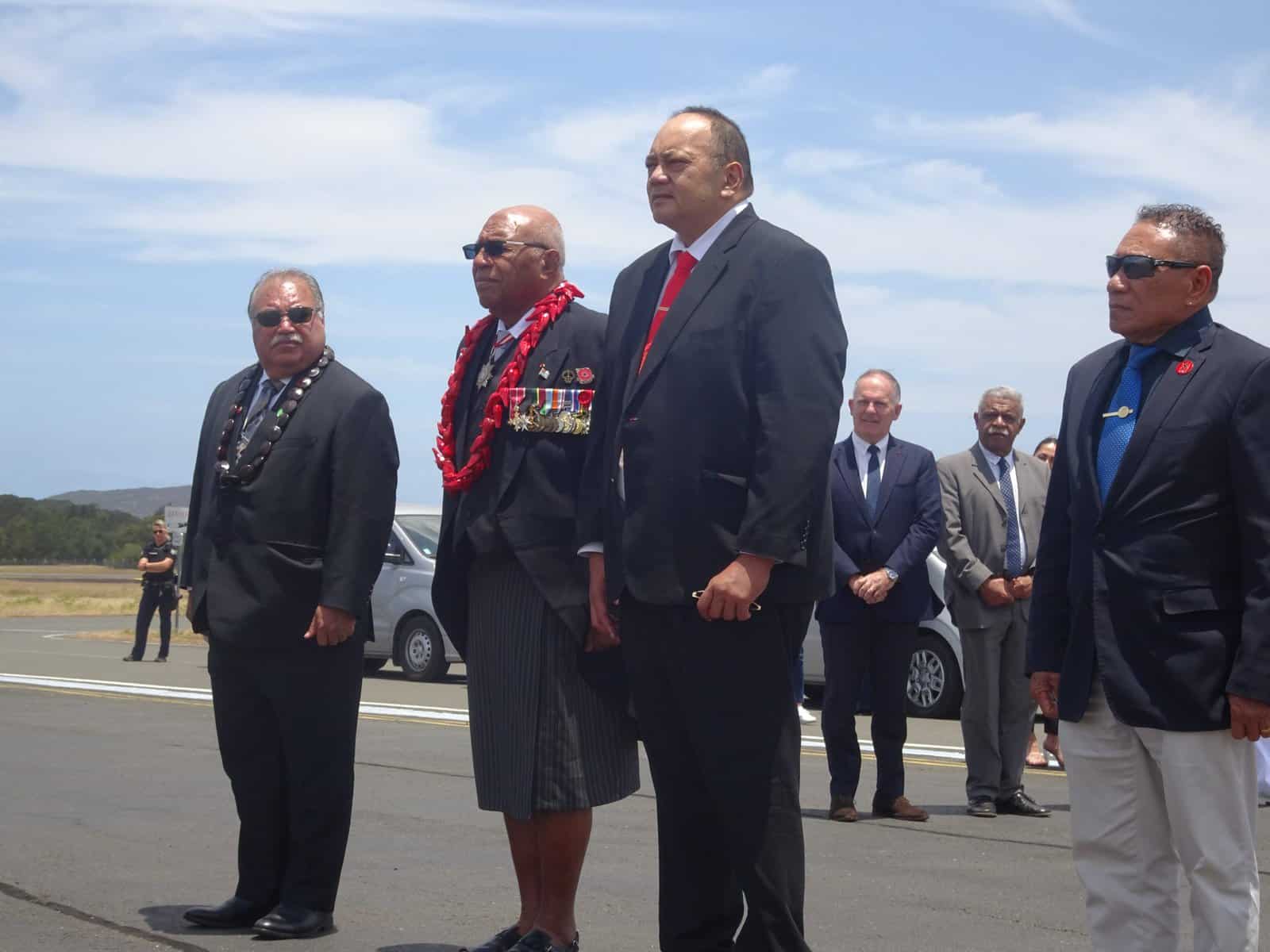After months of delay, a high-level Pacific Islands Forum mission has arrived in New Caledonia for three days of dialogue and information sharing.
In a busy program, the delegation will meet with members of New Caledonia’s Government and Congress, the French High Commission, two of three provincial presidents, as well as civil society, business, customary and church leaders.
The mission is led by Forum Chair Hu’akavameiliku Siaosi Sovaleni, the Prime Minister of Tonga, joined by Cook Islands Prime Minister Mark Brown, Fiji Prime Minister Sitiveni Rabuka and Solomon Islands Minister for Foreign Affairs and Trade Peter-Shanel Agovaka.
Speaking to Kanak customary leaders on Sunday afternoon, Hu’akavameiliku said: “I bring greetings from your family in Oceania. We’re here as family.”
Prime Minister Brown arrived in Noumea on Saturday, welcomed at the airport by French High Commissioner Louis Le Franc, New Caledonia President Louis Mapou and a military guard of honour. On Sunday, the other delegation members arrived by jet from Samoa, where they had been attending the Commonwealth Heads of Government Meeting (CHOGM).
Forum Secretary General Baron Waqa, Deputy Secretary General Esala Nayasi, Ambassador Ratu Inoke Kubuabola and Forum Secretariat staff are accompanying the delegation. It’s a first to have such a high-level mission to New Caledonia involving so many Forum leaders, rather than ministers or diplomats, and a sign that the current crisis in New Caledonia is a matter of regional concern.
Hu’akavameiliku noted the high level of public interest in the mission around the region: “Our thoughts have always been with the people of New Caledonia since the unrest earlier this year, and we continue to offer our support. I am pleased that we are finally undertaking this critical mission, particularly following leaders’ discussion last month. This mission highlights the value of the region in coming together to help each other in times of need.”
For the Forum, “this mission to New Caledonia comes at a pivotal time, as it navigates complex political dynamics and seeks to address ongoing social and economic challenges in New Caledonia. By understanding local perspectives, the Forum can better support ongoing dialogue about New Caledonia’s future, all while respecting its current status.”
Voices from the conflict zone
Travelling from Tontouta airport to the capital on Sunday, the convoy briefly halted at Noumea’s central hospital Medipole and the Kenu-In Commercial Centre, viewing buildings burnt and looted during five months of riots and clashes between Kanak protesters and French security forces.
They later met with French High Commissioner Le Franc and France’s Ambassador to the Pacific Véronique Roger-Lacan. After a long day, the Pacific leaders then arrived at the Sénat coutumier (Kanak Customary Senate) in Nouville. The gathering opened with a cultural exchange, followed by a talanoa dialogue on how Kanak chiefs respond to the current crisis.
Advising the Government and Congress of New Caledonia on matters relating to Kanak culture, identity and land, the Customary Senate has two chiefs from each of the eight aires coutumières (customary regions) in New Caledonia: Iaaï, Drehu and Nengone in the Loyalty Islands, and Hoot Ma Whaap; Paicî-Cèmuhi; Ajië Aro; Xârâcùù; and Drubea-Kapumë on the main island of Grande Terre.
In a speech, president of the Customary Senate Mahé Gowe reflected on recent riots and clashes, noting that “we consider that the political and existential argument [over changes to voting rights] was the trigger, but the fuel that set the country on fire was social inequality and the existence of a two-speed society.”
Watched by High Commissioner Le Franc and French officials, Gowe’s speech noted: “We believe today that the leaders of the administering power must pull themselves together and rethink their approach to the New Caledonian situation. They must take as a given, that the indigenous Kanak people will not take a step backwards.”
Monday’s program begins with a meeting with President Louis Mapou and members of the multi-party Government of New Caledonia, and sessions with Southern Province President Sonia Backès and Loyalty Islands President Jacques Lalié. Forum leaders will also join a meeting with key business leaders and hold a lunch with young New Caledonians.
Then on Tuesday morning, there are further meetings scheduled with church leaders, educationalists and women’s groups, before the delegation flies out on Tuesday afternoon.

Monitoring New Caledonia
The format and objectives of the Forum mission have been complicated from the very beginning, reflecting tension between the Government of New Caledonia and the French State over their shared role in foreign affairs, and France’s status as the administering power of a non-self-governing territory.
Even as the delegation settled into their visit, the media carried a startling report from the other side of the world.
As France underwent its periodic human rights review at the UN Human Rights Council in Geneva last week, French Ambassador Isabelle Rome stated “France, through the referendum of 28 September 1958, completed its decolonisation process and no longer administers a non-self-governing territory within the meaning of Article 73 of the United Nations Charter and within the meaning of UN Resolution 1514. France has no more international obligations in this regard linked to its membership of the United Nations.”
This will be news to the United Nations Special Committee on Decolonisation, the UN General Assembly and the Forum, which view France as the administering power of the non-self-governing territories of New Caledonia and French Polynesia! In December 1986, with support from the Pacific Islands Forum, New Caledonia was re-inscribed on the United Nations list of non-self-governing territories, while French Polynesia was added in 2013.
Regional and international organisations have long played an important role in monitoring the decolonisation process and France’s obligations as a colonial power under international law. Over many years, the Forum has sent ministerial missions to monitor developments and – after New Caledonia joined the Forum as a full member in 2016 – the Forum Secretariat has also sent missions to observe the conduct of elections, as it does for independent members of the regional organisation.
In December 2021, a Forum mission comprising Fiji’s Ratu Inoke Kubuabola, Samoan diplomat Ali`ioaiga Feturi Elisaia (a former UN Ambassador) and then Forum Secretary General Henry Puna travelled to monitor New Caledonia’s third referendum under the Noumea Accord. Their report, presented to Forum leaders in Fiji in July 2022, raised many concerns about the “legitimacy and credibility” of the poll held in the COVID pandemic, where turnout nearly halved and most independence supporters stayed away from the polls.
As the Yes vote dropped from 46% in 2020 to 3.5% in 2021, the mission report noted that “the overall outcome casts serious questions over the legitimacy of the referendum result… The Committee does not believe that the result accurately reflects the will of registered voters. It was a referendum on self-determination that took place without the majority of first peoples of New Caledonia and their supporters.”
Since then, the Forum has continued to monitor growing tensions between the FLNKS independence movement, the French State and anti-independence parties. This year, President Emmanuel Macron’s failed attempt to expand voting rights for New Caledonia’s provincial assemblies and Congress – a process now abandoned by the French government – has culminated in more than five months of riots and clashes since May, with 13 deaths, more than 2,600 arrests, hundreds of businesses shuttered and an exodus of people from the islands.
Dialogue and engagement
Soon after clashes broke out on 13 May, then Forum Chair Mark Brown announced “the Pacific Islands Forum’s readiness to facilitate and provide a supported and neutral space for all parties to come together in the spirit of the Pacific Way, to find an agreed way forward that safeguards the interests of the people of New Caledonia.”
Calling on Paris and Noumea to engage with the Forum, Brown noted on 30 May that “throughout the Forum’s history, regional mechanisms have played a critical supportive role, particularly in instances where other modalities of conflict resolution have stalled. Indeed, our Pacific region is home to independent experts and skilled personnel that are familiar with this region, its history, its people, and importantly, its context, that can support all parties to move this process forward.”
Briefing journalists about this week’s mission, however, Ambassador Véronique Roger-Lacan stressed that the delegation was an “information mission”, not a mediation mission between supporters and opponents of independence.
This week’s visit comes after lengthy behind-the-scenes diplomatic wrangling over the objectives, timing and content of the mission. After months of discussion between the Forum, the Government of New Caledonia and French diplomats, island leaders had hoped the mission could travel before the annual Pacific Islands Forum (held in Tonga in the last week of August) in order to report to the assembled Forum leadership.
However disagreements between the French State and the Government of New Caledonia led to the postponement of the mission just days before Forum delegates gathered in Nuku’alofa. At the time, Mark Brown said that “the New Caledonia Government has identified a number of issues regarding due process and protocol that will need to be addressed prior to a Troika visit. In order to allow additional time to resolve the concerns of our fellow Forum Member, the Forum Troika has decided to postpone their mission until after the Forum Leaders meeting in Tonga.”
In Nuku’alofa, French diplomats negotiated with New Caledonian officials, Forum staff and representatives from Australia and Fiji to finalise an agreed Terms of References for the mission. Since then, the program for this week’s visit has been prepared by a joint committee of the Government of New Caledonia, the Forum Secretariat, staff from the French High Commission and France’s Ambassador to the Pacific.
Last week, a statement from the French High Commission described three of the mission’s objectives: “to better understand the situation in New Caledonia by organising interviews and field visits with all stakeholders, relevant to the resolution of the crisis in New Caledonia; support for the ongoing efforts of the French State and the Government of New Caledonia to call for peace and stability, the de-escalation of ongoing violence and the promotion of dialogue between parties; and to provide a report with clear recommendations to Forum leaders.”
Speaking for the Government of New Caledonia, Charles Wea of the Office of the President said that “the mission comes to listen, to exchange and to dialogue with the population, particularly those impacted by recent events. New Caledonia is a member of the Pacific Islands Forum and is involved in everything that happens in the Pacific. The mission comes in solidarity, to listen and see what are the possible means to support the territory towards political and economic perspectives”.
The Forum also acknowledged “the mission is strictly observational in line with the request of the Government of New Caledonia and will follow the Terms of Reference agreed by the French State, the Government of New Caledonia and endorsed by the Forum Leaders.”
However in the background, it’s hard to avoid the fundamental issue of self-determination and decolonisation. Last week, Prime Minister Sitiveni Rabuka told Radio New Zealand that “we will be talking about the future of negotiations and the relationship between New Caledonia and the people and France.”
